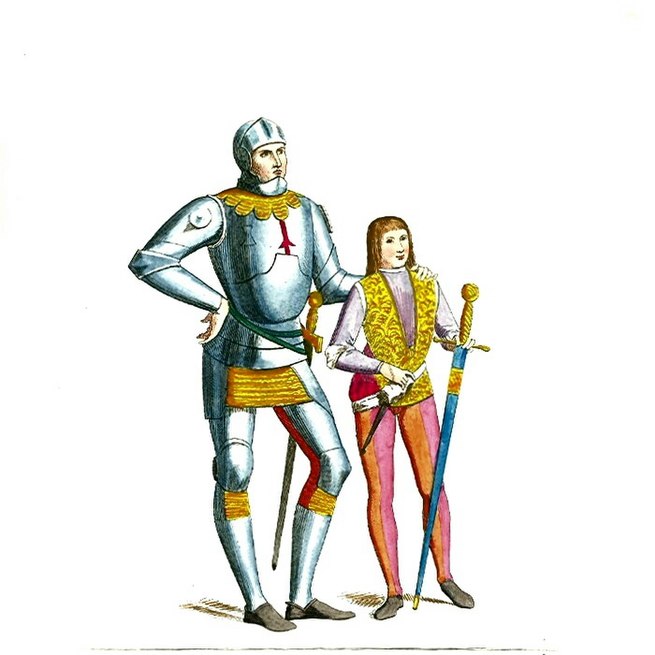Main Difference
The main difference between Esquire and Squire is that the Esquire is a noble title and Squire is a historical profession.
-
Esquire
Esquire (, US also ; abbreviated Esq.) is usually a courtesy title.
In the United Kingdom, Esquire historically was a title of respect accorded to men of higher social rank, particularly members of the landed gentry above the rank of gentleman and below the rank of knight. In 1826, William Blackstone reiterated that, “the title should be limited to those only who bear an office of trust under the Crown and who are styled esquires by the king in their commissions and appointments; and all, I conceive, who are once honoured by the king with the title of esquire have a right to that distinction for life.”By the early 20th century, it came to be used as a general courtesy title for any man in a formal setting, usually as a suffix to his name, as in “Todd Smith, Esq.”, with no precise significance. In the United Kingdom today, it is still occasionally used as a written style of address in formal or professional correspondence. In certain formal contexts, it remains an indication of a social status that is recognised in the order of precedence.In the United States, Esquire is mostly used to denote a lawyer, in a departure from traditional use, and is irrespective of gender. In letters, a lawyer is customarily addressed by adding the suffix Esquire (abbreviated Esq.), preceded by a comma, after the lawyer’s full name.
-
Squire
Starting in the Middle Ages, a squire was the shield- or armour-bearer of a knight. At times, a squire acted as a knight’s errand runner.Use of the term evolved over time. Initially, a squire was a knight’s apprentice. Later, a village leader or a lord of the manor might be called a squire, and still later, the term applied to key public figures, such as justices of the peace or members of parliament. In contemporary American usage, squire is the title given to justices of the peace or similar local dignitaries.
Squire is a shortened version of the word esquire, from the Old French escuier (modern French écuyer), itself derived from the Late Latin scutarius (“shield bearer”), in medieval or Old English a scutifer. The Classical Latin equivalent was armiger (“arms bearer”).
-
Esquire (noun)
A lawyer.
-
Esquire (noun)
A male member of the gentry ranking below a knight.
-
Esquire (noun)
An honorific sometimes placed after a man’s name.
-
Esquire (noun)
A gentleman who attends or escorts a lady in public.
-
Esquire (noun)
A squire; a youth who in the hopes of becoming a knight attended upon a knight
-
Esquire (noun)
A shield-bearer, but also applied to other attendants.
-
Esquire (noun)
A bearing somewhat resembling a gyron, but extending across the field so that the point touches the opposite edge of the escutcheon.
-
Esquire (verb)
To attend, wait on, escort.
-
Squire (noun)
A shield-bearer or armor-bearer who attended a knight.
-
Squire (noun)
A title of dignity next in degree below knight, and above gentleman. See esquire.
-
Squire (noun)
A male attendant on a great personage.
-
Squire (noun)
A devoted attendant or follower of a lady; a beau.
-
Squire (noun)
A title of office and courtesy. See under esquire.
-
Squire (noun)
Term of address to an equal.
-
Squire (noun)
A ruler; a carpenter’s square; a measure.
-
Squire (verb)
To attend as a squire.
-
Squire (verb)
To attend as a beau, or gallant, for aid and protection.
-
Esquire (noun)
a polite title appended to a man’s name when no other title is used, typically in the address of a letter or other documents
“J. C. Pearson Esquire”
-
Esquire (noun)
a title appended to the surname of a lawyer (of either sex).
-
Esquire (noun)
a young nobleman who, in training for knighthood, acted as an attendant to a knight.
-
Esquire (noun)
an officer in the service of a king or nobleman.
-
Esquire (noun)
a landed proprietor or country squire
“the lord of the manor, Richard Bethell Esquire”
-
Squire (noun)
a man of high social standing who owns and lives on an estate in a rural area, especially the chief landowner in such an area
“the squire of Radbourne Hall”
“Squire Trelawny”
-
Squire (noun)
used by a man as a friendly or humorous form of address to another man
“sorry, squire, but I know my limitations”
-
Squire (noun)
a title given to a magistrate, lawyer, or judge in some rural districts.
-
Squire (noun)
a young nobleman acting as an attendant to a knight before becoming a knight himself.
-
Squire (noun)
a subadult snapper fish (Chrysophrys auratus ).
-
Squire (verb)
(of a man) accompany or escort (a woman)
“she was squired around Rome by a reporter”
-
Squire (verb)
(of a man) have a romantic relationship with (a woman)
“he was still squiring Doreen, his high-school sweetheart”

